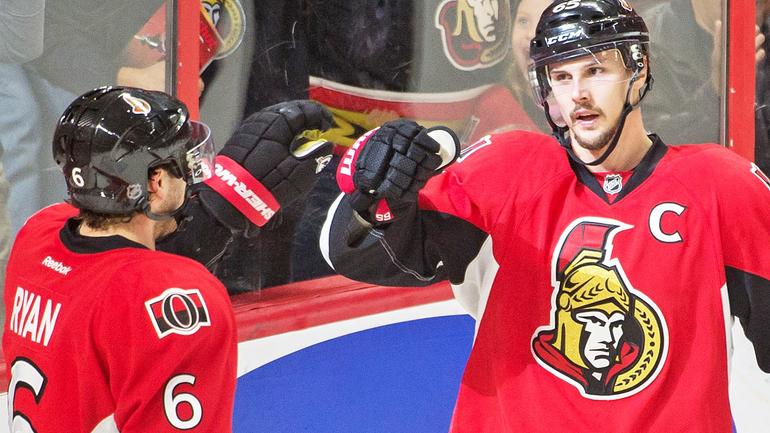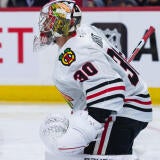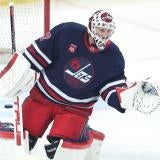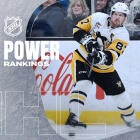Fantasy Hockey: Karlsson in historic territory
Erik Karlsson is on an historic scoring pace for a defenseman. Dan Pennucci explains his regret at drafting Steven Stamkos over the Ottawa sensation.

Erik Karlsson is a cyborg. I'm not convinced he's human.
There's no other way to explain what Karlsson's capable of doing on a hockey rink. The 25-year-old Swede's otherworldly numbers this season -- 32 points through 27 games -- are staggering. That's good enough for fourth in the league, and, if it weren't for Patrick Kane, Karlsson would be challenging the Stars' dynamic duo of Tyler Seguin and Jamie Benn for the Art Ross Trophy. Yes, a defenseman battling for the Art Ross. It could happen, and if anyone on the blue line can do it, he's the one.
It's not that Karlsson is necessarily one of the top few players in the league, though he might be in the conversation. It's that he's such a vital piece to Ottawa, so integral to the team's success. I've said repeatedly that Cory Schneider covers up many holes on the Devils; an even greater claim can be levied for Karlsson. He's easily the most fluid skater in the NHL and the argument can easily be made that no player in the league is more valuable to his team. Not counting the season in which he tore his Achilles tendon, Karlsson has missed just one game since 2011.
What's even more intriguing about Karlsson's production is how vital the points are. He's not padding his stats when the Sens are up four late in the game -- no, these points are winning games. Karlsson potted the overtime goal Saturday against the Islanders on a slick pass from Bobby Ryan only minutes after setting up Mike Hoffman's equalizer with 37 seconds remaining.
Ottawa won the game 3-2, with Karlsson factoring into all three tallies. (Fun fact: Hoffman's 3.21 points per 60 minutes have him third in the league behind Leon Draisatl and Kane entering Sunday).
The Senators topped Chicago 4-3 in overtime Thursday with Hoffman netting the winner on a Karlsson assist. Karlsson was woeful, only factoring into three of his team's goals that evening. Despite the star blueliner being a fixture during three-on-three overtime, he said earlier in the year that he was not wild about the shiny new game-decider; he seems to be coming around now.
Through Sunday, Ottawa has scored 86 goals, and Karlsson has been involved with 37.2 percent of them. To put that in perspective, Benn and Seguin each have factored into 37.6 percent of the Stars' tallies. The problem with the Sens is that they're allowing almost as many goals, with a goal differential of just plus-5, but considering Ottawa is third in the league in scoring, it's not as big of an issue.
Yes, Karlsson can binge occasionally -- fully half his points come in just five games, leaving 16 for the other 22 -- still great numbers for any normal blueliner. He has gone without a point in just over a quarter of Ottawa's games and almost never goes more than one game without getting on the scoresheet.
If you're looking to nitpick, Karlsson's averaging a full shot per game less than he did last season, when he clocked 292 in 82 games (fourth in the league), so he might not crack 20 goals this time around. Through 27 games, he's averaging around 2.5 shots this year.
If this current pace continues, Karlsson will end up challenging 100 points. The odds of this torrent maintaining its flow are unlikely, but he has every chance to finish above a point per game from the blue line. That's a feat even Karlsson hasn't managed in his career. The last player to do it? The man who used to be Mike Green, who did so in consecutive seasons with Washington back in 2008-09 and 2009-10.
This piece is tinged with a bit of regret. I've been a member of a keeper league with fellow RotoWire writer Jan Levine, writers from other sites and several RotoWire users for just under a decade. This past October, due to a series of unfortunate incidents last season, I ended up with the first pick. This league is unique in the fact that we're only allowed seven pickups all season and you can keep a player in the round you drafted him for an additional two seasons, meaning three total.
Karlsson was available for my pick, as was Steven Stamkos. Henrik Lundqvist represented the last unprotected player worthy of that first pick. An argument could be made for all three. I went with Stamkos. Goals are difficult to come by, and with our league using shooting percentage instead of shots, the Tampa Bay sniper seemed like a sage choice: almost a guarantee for 40-50 goals, 70-plus points and a boatload of power-play production.
Despite knowing how much better Karlsson was at his position in terms of point production than his blue-line peers, despite extolling his abilities and despite his near point-per-game finish to last season during Ottawa's improbable playoff run, I passed on Karlsson. I thought I couldn't go wrong with Stamkos or Lundqvist. I did go wrong. Stamkos and his 20 points through Saturday are hurting a bit, but I'm comforted in knowing that others took Stamkos early as well -- not that comforted, but comforted nonetheless.
Rare Statistics
As mentioned, I'm in a league that counts shooting percentage instead of shots on goal, rewarding accuracy rather than volume. In addition to all their exploits this season, Kane (16.2) and Vladimir Tarasenko (15.3) are both firing at over 15 percent, as is Joe Pavelski (15.2). Pavelski has been one of the league's best players in terms of shooting percentage the last three seasons. Benn, however, is far and away tops among those with a large number of shots, clocking in at 22 percent, while Ottawa's Hoffman is scoring on almost one of every five shots, owning 14 goals on just 71 shots for a 19.7 percent success rate.
Those looking for a bit more efficiency in their shooting may want to check out the likes of Kyle Palmieri, Boone Jenner and the Islanders' Frans Nielsen.


















